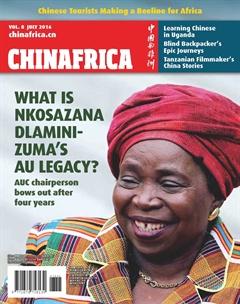In Retrospect
by bob Wekesa

NkosAzANA Dlamini-zuma arrived at the African Union (AU) under a cloud of controversy as her election had torn the continent down the Anglophone and Francophone Africa divide. Anglophone countries, especially from Southern Africa, had supported her bid, while Francophone countries supported Jean Ping, a native of Gabon. However, these divisions fizzled out once she took office in October 2012, proving to be a more unifying than divisive figure.
Legacies left
A key and defining development for Dlamini-Zumas legacy will be Agenda 2063, conceptualized as a paradigm shift in how Africa conducts its affairs. Launched in May 2013 under her to simultaneously commemorate the golden jubilee of the AU, it has become the rallying call for Africas development with the vision of “an integrated, prosperous and peaceful Africa and a dynamic force in the global arena” by 2063.
Apart from the ambitious economic targets that have generated great policy and academic interest in Africa and globally, Agenda 2063 has revived optimism for Pan-African patriotism and renaissance. It is not only the framework currently guiding continental Africas engagement within Africa, but also with other nations and international organizations. As fate would have it, Dlamini-Zuma steered the initiation of the overarching long-term vision only two years before the inauguration of the United Nations Sustainable Development Goals, also known as Agenda 2030, with innumerable linkages.
One of the quick wins of Agenda 2063 was the series of initiatives addressing the cultural, political and economic challenges faced by African women. A testament to the first woman chairperson placing gender issues high up in the AUs list of priorities, the initiative entailed the designation of 2015 as the Year of Womens Empowerment, giving the issue the prominence it deserved.
Dlamini-Zuma will also be remembered for managing emergent African challenges. She led the successful war against the deadly Ebola disease that affected Liberia, Guinea and Sierra Leone. DlaminiZuma oversaw the mobilization of human and financial resources toward combating the Ebola outbreak from African countries on a scale last seen during the struggle for freedom from colonialism.
Commentators have pointed out that incidents of armed conflicts have greatly reduced in Africa, although there remain flashpoints across the continent. It is under her watch that some of the conflicts were resolved. The return of a modicum of peace and tranquility in hitherto war-torn places such as the Central African Republic, Mali and South Sudan stand out as accolades to her stewardship. Some countries still remain restive, such as Somalia, but the fact that they have not degenerated into all-out civil war constitutes a mixed bag of achievements for Dlamini-Zuma. An important ammunition in her arsenal has been reliance on her home country South Africa to buttress the AUs peace and security initiatives.
Challenges faced
Dlamini-Zuma leaves the AU safe in the knowledge that she oversaw the charting of a new path for Africas progress. However, she leaves behind a retinue of unfinished businesses that her successor will have to grapple with. A major challenge is that while Agenda 2063 is big on continental political and economic integration, virtually all African countries are wary of ceding their sovereignty to the AU. This is indeed the elephant in the room that militates against the much-vaunted African unity, rendering continental institutions ineffective.
Another is that while the AU boasts a well-mean-ing charter ratified by all member states, full implementation of its principles remains a huge challenge. This came to the fore spectacularly in 2015, when Burundis President Pierre Nkurunziza came to power for a third term though the constitution says no one may serve for more than two presidential terms. The result has been a crisis in the small Eastern African nation marked by a festering civil war. The AU has blown hot and cold over the crisis, for instance threatening to send a military force into the country only to backtrack in due course. Indeed, the Burundi situation is an exemplar of the dilemma that the AU faces: well-intentioned principles at the Pan-African level that meet intransigence in specific country situations on the ground.
Some of the challenges that the continent faces would be perhaps beyond a single persons intervention. For instance, the global terrorism phenomenon can be seen in Africa in the form of the deadly activities of groups such as Al Shabaab in Eastern Africa and Boko Harm in West Africa, as well as Al Qaeda and ISIS in the Arab Maghreb regions of Northwest Africa. Another challenge that Dlamini-Zuma leaves behind is the global economic slowdown that has afflicted commodities on the continent.

